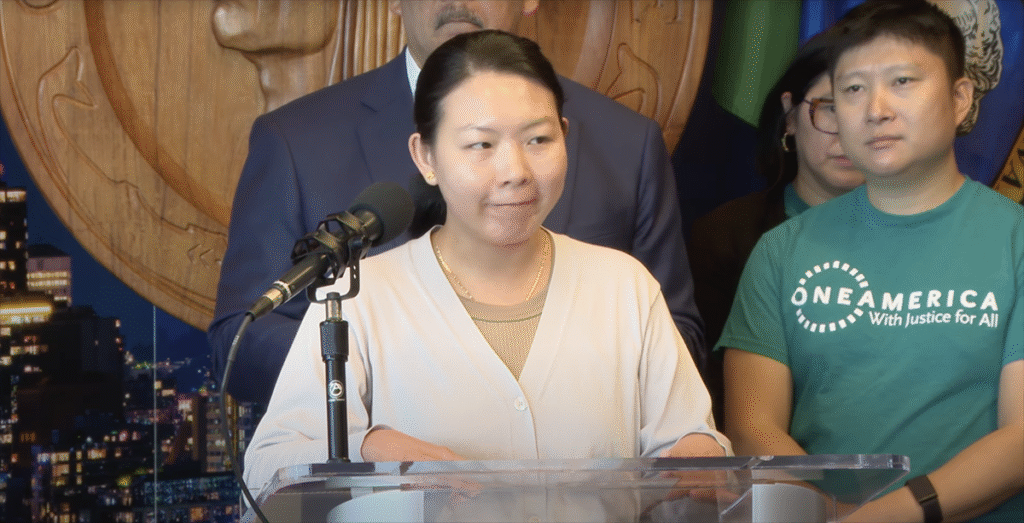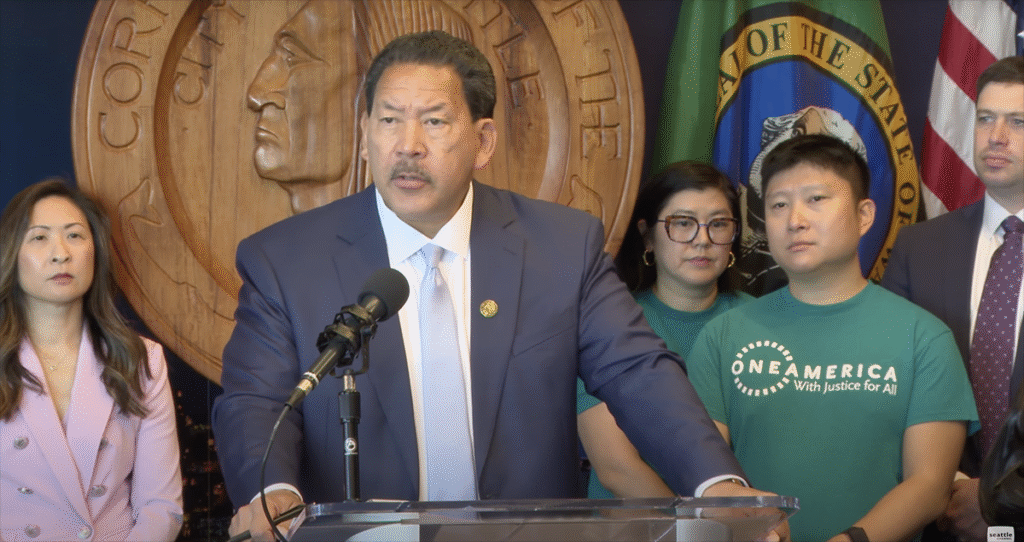By Carolyn Bick
NORTHWEST ASIAN WEEKLY
When she first moved to the United States in 2010, Jinyao Ma struggled to find stable work. Only after she joined the Asian Counseling and Referral Service (ACRS)’s Ready To Work program was she finally able to get her footing in the job market. Ma, who has always been interested in medicine, is studying to be a medical assistant, with the long-term goal of becoming a registered nurse.
But now, 15 years after arriving in the U.S., Ma’s stability—and the stability of countless other immigrants just like her—is in jeopardy, thanks to President Donald Trump’s budget cuts that target programs and government offices meant to help immigrants, refugees, and vulnerable communities.

Jinyao Ma (Screen capture from Seattle Channel)
Ma briefly shared her story at a news conference on Sept. 19, where Mayor Bruce Harrell announced a set of investments meant to support the city’s immigrant and refugee communities, as well as the unhoused community, following federal funding cuts that would otherwise severely hobble programs meant to help them. These investments are reliant upon the Seattle Shield Initiative, which would cut business and occupation taxes on small and mid-sized businesses and impose a heftier tax on large businesses.
While the Seattle City Council unanimously approved the Shield Initiative in August, voters will have the final say in November.

Mayor Bruce Harrell announced expanding services for immigrant and refugee communities on Sept. 19, 2025. (Screen capture from Seattle Channel)
Among the investments Harrell proposed is a $4 million investment to strengthen critical services and increase the city’s Office of Immigrant and Refugee Affairs (OIRA) budget by 60%. He said that this will help OIRA provide immigrants and refugees with more workforce training for youth and English learners, as well as additional safety resources and improved access to city and community programs.
He also said that the office’s budget increase would strengthen rapid response efforts, like legal services, know your rights training, safety planning, and even a hotline to report immigration enforcement activities. The city will also launch initiatives to expand naturalization efforts.
“Immigrants are no stranger to struggles,” OIRA Director Hamdi Mohamed, who came to the U.S. as a 3-year-old refugee, said. “They are the backbone of this workforce in our economy and in this region. They are the small business owners on our main streets. They are the parents raising the next generation of leaders.”
Mohamed said that, in early 2026, the office would announce exactly how the funds will be used and allocated, as well as how community organizations can apply for assistance.
Harrell also proposed $9.35 million to sustain shelter and voucher programs the federal cuts—which Harrell termed as a metaphorical “chainsaw”—put at risk. That money would create a reserve, he said, “to keep shelter doors open and to maintain short-term housing supports and prevent a surge of people onto the streets, particularly when federal shelter funds are withheld from our human service providers.”
King County Regional Homelessness Authority Director Kelly Kinnison said that she has heard firsthand from service providers that they are afraid of the federal cuts’ effects on their budgets, particularly because vouchers and emergency shelter services are sometimes the only lifeline unhoused people have.
Harrell also said the city has proposed an additional $6.2 million to expand the Fresh Bucks program, which will help to increase the monthly stipend of Fresh Bucks participants to $60 and take around 4,000 people off the Fresh Bucks waiting list for the program, which already has about 12,000 participants.
He also said that the city will look to invest an additional $4 million in both food bank support and ongoing rental assistance.
